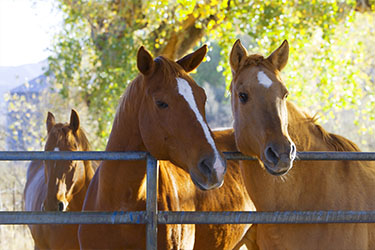Veterinarian Tips: Leptospirosis in Horses

Leptospirosis is a disease more commonly referred to when discussing cattle, pigs, and dogs. However, when the call for equine veterinary care involves an aborted fetus or chronic uveitis, the cause for these serious problems will most often be connected to a diagnosis of leptospirosis.
Leptospirosis is caused by bacteria and found to occur worldwide in both domestic and wild mammals. A zoonotic disease, leptospirosis poses an additional health threat to those working with infected animals.
The following information provides discussion material to share with equine clients.
Mode of Leptospirosis Infection in Horses
A horse can become infected with the leptospirosis bacteria when it comes into contact with infected urine, blood, or tissue via:
- Open wounds
- Mucous membranes of the eyes or mouth
- Eating contaminated hay or grain
- Drinking contaminated water
- Direct splashing of infected urine into the eyes or mouth
- Breeding.
Clinical Signs of Equine Leptospirosis
An infected animal may be observed with clinical signs that include:
- Fever
- Inappetence
- Pain
- Eye swelling
- Tearing
- Eye discharge
- Eye cloudiness
- Redness surrounding the eye
- Muscle spasms strong enough to close the eye
- Light sensitivity
- Chronic uveitis, also referred to as moon blindness
- Calcification of the cornea
- Eye atrophy
- Increased intraocular pressure
- Permanent blindness
- Lethargy
- Mid- to late-term abortion
- Acute renal failure.
Diagnosis of Equine Leptospirosis
Because the clinical signs of leptospirosis are common to other diseases, a positive diagnosis of leptospirosis requires confirmation through a blood or urine test.
When the concern of leptospirosis is based on an abortion, diagnosis may involve:
- Fluorescent antibody testing (FAT)
- Immunohistochemical evaluation of the:
- Placenta
- Umbilical cord
- Fetal liver
- Fetal kidney.
Additional testing for the disease may focus on information gathered from:
- Serum antibody titers
- Evaluation of urine, ocular fluids, blood.
Treatment of Leptospirosis in Horses
Antibiotics such as penicillin and tetracycline are often used, but are not found to benefit an animal suffering from chronic uveitis. There is no vaccine against leptospirosis for use in horses.
Prevention of Leptospirosis
Reducing the risk of exposure to the bacteria is the best way to combat this disease. Farm management techniques that can be put into action include:
- Removing all stagnant water sources
- Fencing off ponds and water sources in an effort to prevent animals from walking into the water and contaminating it with urine carrying the leptospirosis bacteria
- Restricting areas where the bacteria can survive, such as areas of moist soil during seasons of mild temperatures
- Removing stored feed from open access in order to keep out infected wildlife, including mice and rats, that could urinate and contaminate the feed with bacteria, minimizing the contact between wildlife and horses is important
- Establishing a routine disinfecting program focused on killing the bacteria.
When Should Horse Owners Contact the Veterinarian?
Horse clients need to be reminded that should a mare abort or if any of their horses appear with chronic uveitis, it is important to contact the veterinarian right away.
- First, the animal will need prompt veterinary care
- Second, samples of the affected animal’s blood, urine, fetus, and/or placenta, should be properly collected and sent for testing
- Information obtained through the collected samples will provide helpful information as to the cause, as well as for treatment.
If a horse is exposed to leptospirosis, it doesn’t always mean that the animal will become seriously ill. However, if a horse becomes ill and the client lives on a property that may present a risk for the disease, such as near another farm with past diagnosed cases, it may be beneficial to pursue diagnostic tests.
Contact your Covetrus representative to learn more about equine diseases online or at 855.724.3461


Working Here
Our team members are encouraged to be the best they can be... at Covetrus we believe we impact one another.
Learn MoreNews & Events
FDA Cautions Pet Owners Not to Feed Texas Tripe Inc. Raw Pet Food Due to Salmonella, Listeria Monocytogenes
The U.S. Food and Drug Administration is cautioning pet owners not to feed their pets any of the Texas Tripe brand raw frozen pet food listed below because several samples of Texas Tripe raw pet food have tested positive for Salmonella and/or L. mono.
Careers
Are you looking for a place to let your talents shine? At Covetrus, we help our practitioner customers better serve their patients and take pride in providing the best customer experience possible. Search our open positions to see our available opportunities.
Newsletter
Stay current with what’s going on with Covetrus, subscribe to receive our newsletter and email communications. Subscribers will receive the latest information in practice management, sales and marketing, animal health, and more.



-3-(1).png?sfvrsn=2d806d73_0)

Leave a comment